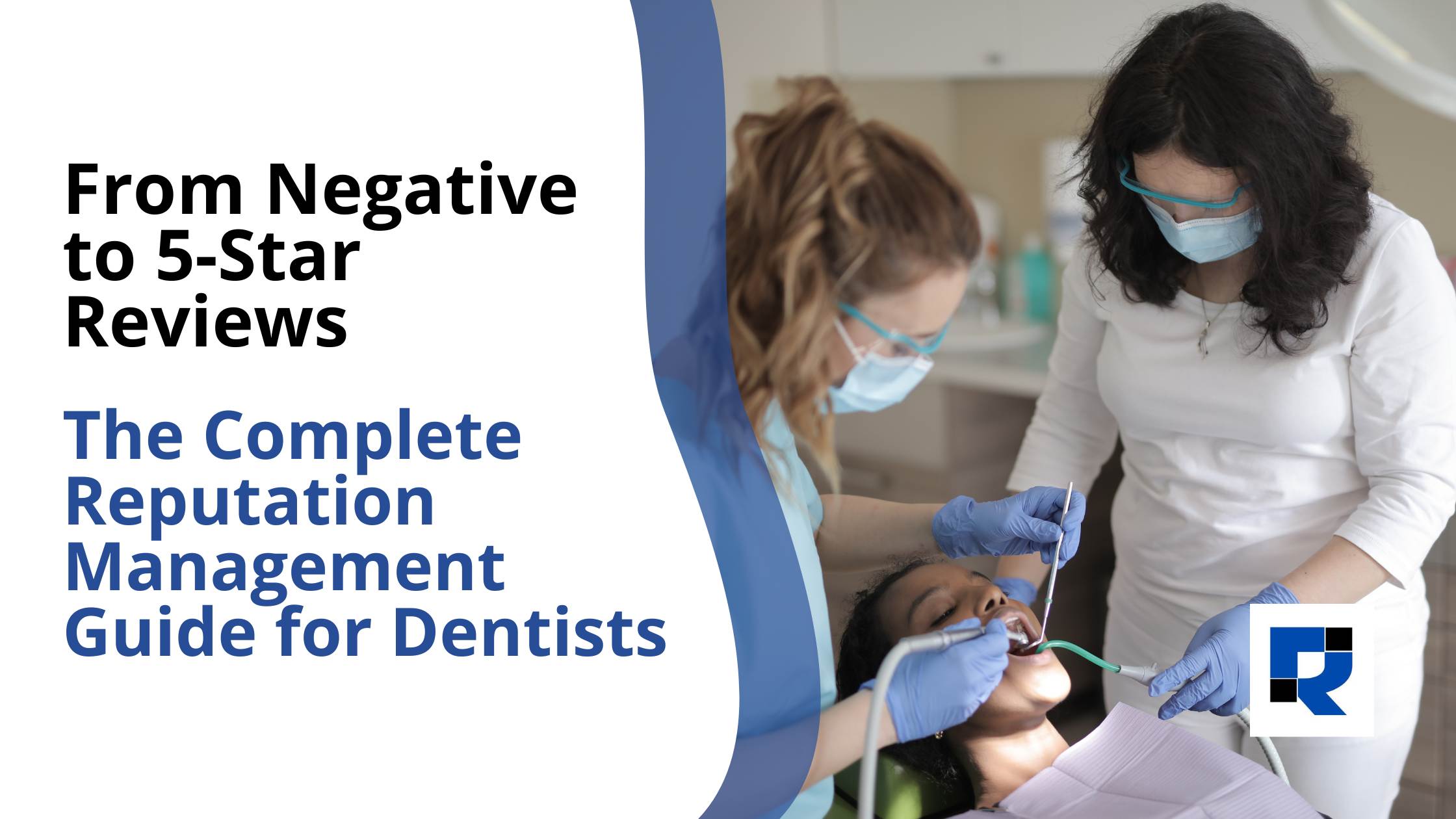Your dental clinic’s and practice’s online reputation serves as the modern equivalent of word-of-mouth referrals. Research consistently shows that 84% of people trust online reviews as much as personal recommendations, and for healthcare providers specifically, this number climbs even higher. When prospective patients search for a dentist in their area, they’re not just looking at your credentials or services—they’re scrutinizing what your existing patients have to say about their experiences.
For dental practices, managing online reviews isn’t merely about vanity metrics or digital marketing. It’s about building trust in an industry where anxiety and apprehension are common patient emotions. A robust collection of authentic, positive reviews can be the deciding factor that transforms a hesitant searcher into a confident new patient walking through your door.
This comprehensive guide explores proven strategies for encouraging positive patient reviews while developing effective protocols for addressing negative feedback. Whether you’re a solo practitioner or managing a multi-location dental group, these actionable insights will help you cultivate a stellar online reputation that drives sustainable practice growth.
Table of Contents
- Importance of Reviews for Dental Practices
- Creating a Systematic Approach to Requesting Patient Reviews
- Crafting Communication That Inspires Authentic, Detailed Reviews
- Strategic Management of Negative Reviews and Critical Feedback
- Understanding the Different Types of Negative Reviews
- Building a Review-Friendly Practice Culture
- Leveraging Technology and Professional Reputation Management Services
- Optimizing Your Presence on Key Review Platforms
- Advanced Strategies for Practices Ready to Level Up
- Measuring Success and ROI of Your Review Management Efforts
- Common Mistakes Dental Practices Make With Review Management
- Future-Proofing Your Dental Practice’s Online Reputation
- Conclusion
- Frequently Asked Questions
Understanding the Critical Importance of Online Reviews for Dental Practices
Before diving into tactical strategies, it’s essential to understand why online reviews carry such tremendous weight in the dental industry specifically.
The Trust Factor in Healthcare Decisions
Unlike choosing a restaurant or purchasing a product, selecting a healthcare provider involves significant trust and vulnerability. Patients are literally putting their health—and in dentistry’s case, their smile, comfort, and sometimes their appearance—in your hands. This high-stakes decision-making process makes social proof through reviews absolutely critical.
Studies from the Pew Research Center indicate that 77% of patients use online reviews as their first step in finding a new healthcare provider. For dentists, this percentage is even more pronounced because dental care often involves:
- Significant financial investment
- Potential discomfort or anxiety
- Aesthetic concerns that impact self-confidence
- Long-term relationships spanning years or decades
The SEO and Visibility Advantage
Beyond the trust factor, reviews directly impact your practice’s visibility in local search results. Google’s local search algorithm heavily weights review quantity, quality, recency, and diversity when determining which practices appear in the coveted “local pack”—those top three results with map pins that dominate mobile searches.
Practices with consistent, recent reviews signal to search engines that they’re active, engaged with patients, and worthy of prominent placement. Moreover, reviews containing specific keywords (like “gentle dentist,” “great with kids,” or “cosmetic dentistry”) help search engines understand your specialties and match you with relevant searcher intent.
The Revenue Impact
The business case for review management is compelling. Research from Harvard Business School found that a one-star increase in Yelp rating leads to a 5-9% increase in revenue. For dental practices, where average patient lifetime value can exceed $25,000, even modest improvements in your review profile can translate to substantial revenue growth.
Struggling to Keep Up With Review Management?
Creating a Systematic Approach to Requesting Patient Reviews
The foundation of a strong review profile starts with having a consistent, systematic process for requesting feedback from satisfied patients. Many dental practices struggle here not because their patients aren’t happy, but because they lack a structured approach to asking.
Identifying the Optimal Timing
Timing is everything when requesting reviews. You want to catch patients when they’re feeling most positive about their experience but before the memory fades. For dental practices, several moments present ideal opportunities:
Immediately after successful treatment completion: When a patient has just completed a procedure that went smoothly, their satisfaction is at its peak. This is particularly effective after cosmetic procedures, pain-relief treatments, or completing a long treatment plan.
Following a particularly positive interaction: If a patient verbally expresses gratitude or satisfaction, this is your green light. Train your staff to recognize these moments and have a process ready.
24-48 hours post-appointment: This window allows any post-procedure discomfort to subside while the positive aspects of the experience remain fresh. Automated email or SMS requests work well in this timeframe.
Developing Multiple Request Methods
Different patients respond to different communication channels. A multi-channel approach ensures you’re meeting patients where they’re most comfortable:
In-person verbal requests: Train your front desk staff and hygienists to make genuine, personal requests. A simple “We’d love to hear about your experience today. Would you be willing to share a quick review online?” accompanied by a printed card with simple instructions can be remarkably effective.
Digital follow-up communications: Automated email sequences that trigger after appointments allow you to scale your review requests without adding staff workload. These should feel personal, mention specific treatments or interactions when possible, and make the process as simple as possible.
Text message requests: SMS boasts open rates exceeding 90%, making it an incredibly effective channel for review requests. Keep messages brief, friendly, and include direct links to your preferred review platforms.
Making the Process Effortlessly Simple
Friction is the enemy of follow-through. Every additional step between your request and the submitted review decreases completion rates dramatically. Consider these friction-reducing strategies:
Create a dedicated landing page that presents patients with one-click access to all your major review platforms (Google, Yelp, Healthgrades, Facebook). Reputation management companies like ReputaForge can help automate this process, intelligently directing satisfied patients to public review sites while routing potentially negative feedback through private channels for resolution.
Provide QR codes at your front desk and in patient communications that instantly direct to your review request page. This eliminates the need for typing URLs or searching for your practice online.
Keep instructions minimal and clear. Assume patients have never left a review before and guide them accordingly.
Crafting Communication That Inspires Authentic, Detailed Reviews
The quality of reviews matters as much as quantity. Detailed, specific reviews carry more weight with both prospective patients and search algorithms than generic “great dentist” comments.
Personalization Makes the Difference
Generic review requests generate generic reviews—if they generate anything at all. Personalized communication that references the specific treatment, celebrates the outcome, or acknowledges particular concerns the patient had creates a narrative framework for more meaningful reviews.
For example, instead of: “Please leave us a review,” try: “We know you were nervous about your root canal, and we’re so glad Dr. Smith could make the experience comfortable for you. Would you be willing to share your experience to help other anxious patients feel more confident?”
The Art of the Ask: Language That Converts
How you phrase your review request significantly impacts response rates. Consider these principles:
Express genuine interest in their feedback: Position reviews as valuable feedback that helps you improve, not just marketing material. “Your feedback helps us continue providing the best possible care.”
Acknowledge their time: Respect that leaving a review requires effort. “We know you’re busy, but if you could take two minutes to share your experience, it would mean the world to us.”
Explain the impact: Help patients understand how their review helps others. “Your review helps anxious patients feel more comfortable choosing a dentist.”
Make it about them, not you: Frame the review as their opportunity to share their story and potentially help others, rather than as a favor to your practice.
Encouraging Specificity Without Scripting
While you can’t dictate what patients write, you can guide them toward more detailed, helpful reviews through thoughtful prompting:
In your review requests, include optional prompts like:
- “What specific aspect of your visit stood out most?”
- “How did our team make you feel comfortable?”
- “What would you tell a friend who was considering our practice?”
These open-ended questions encourage storytelling rather than simple star ratings, resulting in reviews that provide valuable information to prospective patients while naturally incorporating keywords relevant to your practice.
Ready to Transform Your Practice’s Online Reputation?
Strategic Management of Negative Reviews and Critical Feedback
Even exceptional dental practices receive negative reviews occasionally. How you handle these moments defines your reputation as much as your positive reviews do. Prospective patients often read negative reviews specifically to assess how you respond to problems.
The Response Management: Speed, Empathy, and Solutions
When negative feedback appears, time is of the essence. Prompt responses demonstrate that you take patient concerns seriously and actively monitor your online presence. Aim to respond within 24 hours, certainly within 48 hours maximum.
Your response should follow this structure:
Acknowledge and empathize: Begin by validating the patient’s feelings, even if you disagree with their characterization of events. “We’re genuinely sorry to hear about your experience” shows emotional intelligence and patient-centered values.
Take responsibility appropriately: If the criticism is valid, own it. If there’s been a misunderstanding, address it gracefully without being defensive. “We clearly fell short of the standard we set for ourselves” or “It seems there may have been a miscommunication, and we’d like to clarify…”
Move the conversation offline: Provide a direct contact (phone number or email) and invite the patient to discuss the matter privately. “Please call our office manager directly at [number] so we can address this properly.” This demonstrates genuine concern while protecting patient privacy and preventing public escalation.
Demonstrate commitment to improvement: When appropriate, briefly mention specific steps you’re taking to prevent similar issues. This shows prospective patients reading the review that you’re continuously improving.
Understanding the Different Types of Negative Reviews
Not all negative reviews require the same approach. Categorizing complaints helps you respond appropriately:
Legitimate service failures: These require genuine apologies, accountability, and visible commitment to resolution. These are actually opportunities to showcase your professionalism and patient commitment.
Misunderstandings or miscommunications: These need clarification while avoiding defensiveness. Focus on education and offering to discuss further privately.
Unreasonable or fraudulent reviews: These are trickier. Respond professionally, state facts without revealing protected health information, and if appropriate, flag the review with the platform for violating guidelines.
Staff-related complaints: These require particular sensitivity. Defend your team when appropriate, but demonstrate that you take such concerns seriously and will investigate internally.
Turning Negative Reviews Into Opportunities
A well-handled negative review can actually enhance your reputation. When prospective patients see you responding professionally, empathetically, and proactively to criticism, it builds trust. It demonstrates that:
- You’re actively engaged with patient feedback
- You take concerns seriously regardless of whether they’re publicly visible
- You’re committed to continuous improvement
- You treat patients as individuals worthy of personal attention
Consider this: practices with exclusively five-star reviews sometimes appear less authentic than those with mostly excellent reviews plus occasional criticisms handled professionally.
Building a Review-Friendly Practice Culture
Sustainable review generation doesn’t happen through occasional campaigns—it requires embedding patient feedback into your practice culture.
Training Your Entire Team
Every patient touchpoint is an opportunity to create review-worthy experiences. From the receptionist who answers the phone to the hygienist providing cleanings to the dentist performing procedures, every team member influences patient satisfaction.
Conduct regular training sessions focused on:
- The importance of reviews to practice growth (and job security)
- Identifying moments when patients are particularly satisfied
- How to make comfortable, genuine review requests
- The review request process and tools you’re using
- Celebrating reviews and feedback as a team
Creating Review-Worthy Experiences
The most sustainable path to positive reviews is simply delivering consistently exceptional patient experiences. While this might seem obvious, it’s worth examining systematically:
Eliminate common patient frustrations: Long wait times, confusing billing, feeling rushed, poor communication, unexpected costs, and uncomfortable environments are common complaints across healthcare. Conduct honest assessments of where your practice might fall short and systematically address these issues.
Exceed expectations in small ways: Little touches create memorable moments that patients want to share. This might include follow-up calls after procedures, remembering personal details about patients’ lives, offering comfort items during treatments, or simply taking time to answer questions thoroughly.
Make patients feel valued as individuals: In healthcare, feeling like a number rather than a person is a common complaint. Combat this through personalized care, remembering previous conversations, and showing genuine interest in your patients’ wellbeing beyond their dental health.
Implementing Feedback Loops
Create multiple channels for patients to provide feedback internally before they ever consider leaving public reviews:
- Post-appointment surveys that capture satisfaction metrics
- Suggestion boxes (physical and digital) for anonymous feedback
- Regular patient advisory meetings where loyal patients provide candid input
- Staff debriefs to discuss patient concerns raised during appointments
These internal feedback mechanisms serve dual purposes: they identify potential issues before they become public complaints, and they provide insights for continuous improvement.
Leveraging Technology and Professional Reputation Management Services
Manual review management becomes unsustainable as practices grow. Technology solutions and professional review management services streamline the process while improving results.
The Case for Professional Reputation Management Services
Specialized reputation management companies like ReputaForge offer comprehensive solutions designed specifically for healthcare providers who need to manage reviews while maintaining HIPAA compliance and protecting patient privacy.
Professional reputation management services typically provide:
Automated review request workflows: Experts set up systems that send review requests at optimal times without requiring staff intervention. This ensures consistency and eliminates the primary reason review generation falls by the wayside—simple forgetfulness.
Intelligent routing systems: Professional services can implement systems that detect sentiment in initial feedback responses and route potentially negative feedback through private resolution channels before it becomes a public review. This gives you opportunities to address concerns and potentially convert dissatisfied patients into satisfied ones who then leave positive public reviews.
Multi-platform review management: Rather than logging into Google, Yelp, Healthgrades, Facebook, and other platforms separately, reputation management companies provide consolidated systems allowing you to monitor and respond to all reviews from one interface.
Analytics and insights: Understanding review trends, identifying common themes in feedback, tracking response rates, and measuring the impact of review initiatives requires data analytics that professional services provide.
HIPAA-compliant communication: Generic review solutions don’t understand healthcare privacy requirements. Specialized healthcare reputation management companies ensure all communications and data handling meet regulatory standards.
Review response strategy and guidance: While responses should be personalized, having professional frameworks and strategic guidance helps maintain consistency and professionalism while saving time.
Selecting the Right Partner for Your Practice
When evaluating reputation management companies, consider:
- Experience specifically with dental practices
- Understanding of healthcare compliance requirements
- Integration capabilities with your existing practice management software
- Comprehensive dental reputation management services offerings beyond just software
- Quality of customer support and account management
- Transparent pricing structure relative to your practice size
- Track record and client testimonials from other dentists
- Ongoing strategy and consulting support
Companies like ReputaForge.com, which specialize in healthcare reputation management, understand the unique challenges dental practices face—from patient anxiety around reviews to regulatory compliance to the importance of local SEO for attracting nearby patients.
Let the Experts Handle Your Reputation Management
Optimizing Your Presence on Key Review Platforms
Different review platforms serve different purposes and reach different audiences. A strategic approach means optimizing your presence across the most impactful platforms.
Google Business Profile: Your Digital Storefront
Google remains the dominant starting point for local searches, making your Google Business Profile your single most important review platform. Optimize it by:
- Ensuring all information is complete and accurate (hours, services, photos, contact information)
- Adding high-quality photos regularly (treatment rooms, staff, exterior, patient-safe treatment results)
- Utilizing Google Posts to share updates, promotions, and practice news
- Responding to every review, positive or negative
- Monitoring and answering the Q&A section
- Encouraging reviews specifically on Google to improve local pack rankings
Healthcare-Specific Platforms
Healthgrades, Vitals, and similar healthcare-specific directories carry particular weight for medical and dental searches. These platforms often provide more detailed provider information and allow patients to search by specialty, accepted insurance, and specific services.
Claim and optimize your profiles on these platforms, ensuring consistency in your information across all listings. This consistency (known as NAP—Name, Address, Phone consistency) impacts local SEO significantly.
Social Media as Review Platforms
Facebook reviews integrate with social sharing, extending their reach beyond the platform itself. Additionally, many practices find their existing social media followers are most willing to leave reviews, making Facebook a good starting point for building review momentum.
Yelp presents unique challenges in the dental industry, as the platform has strict policies against incentivized reviews and may filter reviews it deems suspicious. Focus on genuine patient experiences and never offer incentives for Yelp reviews specifically.
Monitoring and Managing Review Platform Profiles
Set up Google Alerts or use monitoring tools to receive notifications whenever your practice is mentioned online. This ensures you never miss a review that requires response and allows you to discover reviews on platforms you might not check regularly.
Advanced Strategies for Practices Ready to Level Up
Once you’ve mastered the fundamentals, these advanced strategies can take your reputation management to the next level.
Video Reviews and Testimonials
Video content dramatically outperforms text in engagement and emotional impact. Video testimonials feel more authentic and create stronger connections with prospective patients. Consider:
- Offering patients the option to record brief video testimonials at your practice
- Creating a comfortable setup with good lighting and sound
- Providing prompts but encouraging natural, unscripted responses
- Sharing these videos on your website, social media, and YouTube
- Obtaining proper releases for video use while maintaining HIPAA compliance
Influencer and Community Partnerships
Local influencers, community leaders, and business partners can amplify your reputation beyond traditional patient reviews. When respected community members share positive experiences with your practice, it carries significant weight.
Build relationships with local businesses for cross-referrals, participate in community events, and consider partnerships with local influencers whose audiences match your ideal patient demographics.
Case Study Showcases
For practices offering specialized or cosmetic services, detailed case studies (with patient permission) provide compelling social proof. These go beyond simple reviews to showcase your expertise, technology, and results.
Before-and-after photography (following ethical guidelines), detailed treatment explanations, and patient journey stories create engaging content that demonstrates value while building trust.
Review-Gating: The Ethical Considerations
Review-gating refers to asking for feedback privately first, then directing only satisfied patients toward public review platforms. While this can improve your overall rating, it raises ethical concerns and violates some platforms’ terms of service.
The more ethical and sustainable approach, exemplified by reputation management companies like ReputaForge.com, involves directing all patients toward feedback opportunities but providing private resolution channels for negative experiences before they become public reviews. This respects patient choice while giving you opportunities to address concerns proactively.
Measuring Success and ROI of Your Review Management Efforts
What gets measured gets managed. Track these metrics to assess the effectiveness of your review management strategies:
Quantitative Metrics:
- Total number of reviews across platforms
- Average rating on each platform
- Review velocity (new reviews per month)
- Response rate and average response time
- Conversion rate from review requests sent to reviews received
- Website traffic from review platforms
- New patient acquisition source data
- Patient lifetime value of those acquired through online reputation
Qualitative Metrics:
- Sentiment trends in review content
- Common themes in positive reviews (what are you consistently praised for?)
- Recurring issues in negative reviews (what needs improvement?)
- Keyword frequency in reviews (are patients mentioning your specialties?)
Business Impact Metrics:
- New patient appointment requests trend
- Percentage of new patients citing reviews as their decision factor
- Cost per new patient acquisition
- Revenue growth correlated with review profile improvements
Regularly review these metrics (monthly at minimum) to identify trends, celebrate successes, and address weaknesses in your review management strategy.
Common Mistakes Dental Practices Make With Review Management
Learning from common pitfalls can save you significant trouble:
Inconsistency: Starting strong with review requests then letting the process lapse creates uneven review flow and missed opportunities. Working with reputation management companies like ReputaForge.com prevents this common problem through systematic processes.
Ignoring negative reviews: Failing to respond to criticism amplifies the damage and suggests you don’t care about patient concerns.
Defensive or argumentative responses: Even when reviews are unfair, defensive responses make you look unprofessional and can escalate situations.
Violating patient privacy: Never share protected health information in review responses, even when defending against false claims.
Incentivizing reviews improperly: Offering discounts or rewards for reviews violates most platforms’ terms of service and can result in penalties or removed reviews.
Fake reviews: Posting fake positive reviews or asking friends and family to post reviews without disclosure is unethical, often detectable, and can result in serious penalties.
Focusing solely on star ratings: Quality, detailed reviews provide more value than quantity of brief ratings.
Neglecting review diversity: Having all reviews appear within a short timeframe appears suspicious to both platforms and potential patients.
Future-Proofing Your Dental Practice’s Online Reputation
The digital reputation landscape continues evolving. Stay ahead by anticipating these trends:
Artificial Intelligence and Review Analysis: AI tools are increasingly capable of analyzing review sentiment, identifying trends, and even generating response suggestions. However, authentic, personalized responses will always outperform generic AI-generated replies.
Video Reviews Becoming Standard: As video content dominates online consumption, expect video reviews to become more prominent across platforms.
Voice Search Optimization: As voice-activated searches increase, optimizing for how people verbally ask questions about dentists becomes crucial. Reviews containing natural language descriptions help with voice search visibility.
Reputation Integration with Telehealth: Virtual consultations and telehealth are here to stay. Your online reputation will increasingly influence both in-person and virtual patient acquisition.
Increased Platform Scrutiny: Review platforms are implementing more sophisticated fraud detection, making authentic review generation more important than ever.
Conclusion
In an era where your online reputation often determines practice success before a prospective patient ever makes contact, strategic review management isn’t optional—it’s essential. The practices that thrive in today’s competitive landscape are those that systematically generate positive reviews, handle negative feedback with professionalism and grace, and continuously improve based on patient insights.
Building a stellar online reputation requires commitment across three dimensions: creating consistently exceptional patient experiences worth reviewing, implementing systematic processes for requesting and managing reviews, and leveraging professional expertise to scale these efforts sustainably.
For dental practices serious about reputation management, specialized companies like ReputaForge provide comprehensive solutions designed specifically for healthcare providers. These reputation management experts help automate tedious tasks while maintaining the personal touch that makes reviews authentic and compelling, all while ensuring compliance with healthcare privacy regulations.
Remember that reputation management is a marathon, not a sprint. The practices seeing the most significant results are those that embed patient feedback into their culture, respond consistently to all reviews, and view their online reputation as an ongoing conversation with their community rather than a marketing campaign.
Your online reputation is your practice’s most valuable marketing asset. Invest in it wisely, manage it thoughtfully, and watch as it becomes your most effective tool for sustainable practice growth.
Don’t Let Another Patient Choose Your Competitor
Frequently Asked Questions
Q1: How many reviews does my dental practice need to be competitive?
Answer: The answer varies significantly based on your location, competition, and practice size, but research provides helpful benchmarks. For most dental practices, achieving 50+ positive Google reviews creates a solid foundation that builds patient trust. However, in competitive urban markets, top-performing practices often have 200+ reviews.
More important than absolute numbers is review velocity—the rate at which you receive new reviews. Practices receiving 5-10 new reviews monthly signal to both search engines and potential patients that you’re actively engaged and consistently delivering quality care. Stale review profiles with no recent feedback, even if the average rating is high, raise questions about whether you’re still providing the same quality of service.
Focus first on surpassing your closest competitors’ review counts and ratings. Analyze the top 3-5 dental practices in your area to understand the local benchmark. Remember that review quality matters significantly—ten detailed, specific reviews often provide more value than fifty generic “great dentist” comments.
Reputation management companies like ReputaForge.com help establish consistent review generation processes that build momentum over time, ensuring you maintain competitive review velocity without the manual effort that causes many practices to fall behind.
Q2: What should I do if a competitor is posting fake negative reviews about my practice?
Answer: Fake negative reviews from competitors or malicious actors represent a serious but unfortunately common challenge. If you suspect fraudulent reviews, take these steps systematically:
First, document everything. Screenshot the suspicious review, note the posting date, and identify specific indicators of fraud (reviewer has no history, multiple dental practices reviewed negatively on the same day, contains factually impossible claims, etc.).
Second, respond publicly to the review professionally without accusing anyone of fraud. Your response should be brief: “We have no record of this patient in our system. We take all feedback seriously and would appreciate if you could contact our office directly at [number] so we can investigate this matter.”
Third, flag the review with the platform. Every major review site has processes for reporting fraudulent reviews. Provide all documentation supporting your claim. Google, Yelp, and others do remove reviews that violate their policies, though the process can take weeks.
Fourth, if the fraudulent reviews persist and you can identify the source, consult with an attorney about cease-and-desist letters or other legal action. False negative reviews constitute defamation and business interference in many jurisdictions.
Finally, the best defense against fraudulent negative reviews is a robust collection of authentic positive reviews. When your practice has hundreds of genuine positive reviews, the impact of occasional fraudulent negative reviews diminishes significantly. Focus your primary energy on systematic authentic review generation rather than becoming consumed by fighting fake reviews.
Q3: Should I respond to every review, including positive ones?
Answer: Yes, you should respond to every review—both positive and negative—though your responses can and should vary in length and tone based on the review content.
For positive reviews, responses serve multiple important functions. They demonstrate appreciation, encourage future reviewers by showing you’re engaged, provide opportunities to reinforce your brand message, and can even improve SEO by incorporating relevant keywords naturally.
Your positive review responses don’t need to be lengthy. A personalized 2-3 sentence response acknowledging their specific comments shows authentic engagement. For example: “Thank you so much, Jennifer! We’re thrilled that Dr. Martinez could help ease your anxiety about the root canal. Making nervous patients comfortable is one of our highest priorities. We look forward to seeing you at your next cleaning!”
For negative reviews, responses are absolutely critical. Prospective patients often read negative reviews specifically to see how you handle problems. A professional, empathetic response to criticism can actually enhance your reputation by demonstrating patient-centered values and commitment to improvement.
The only exception to the “respond to everything” rule might be extremely brief, generic positive reviews (“Good dentist!”) from reviewer profiles with minimal activity. Even then, a brief thank you maintains consistency and shows appreciation.
Response fatigue is real, especially for busy practice owners. This is where reputation management companies like ReputaForge.com prove invaluable, offering strategic guidance, systematic workflows, and centralized management that makes responding to reviews across multiple platforms far less time-consuming.
Q4: Can I offer incentives to patients who leave reviews?
Answer: This is a nuanced question with both ethical and platform policy considerations. The short answer is: you can thank patients who leave reviews, but you should never condition rewards on leaving reviews, nor should you offer rewards only for positive reviews.
Google explicitly prohibits offering incentives in exchange for reviews. Yelp is even stricter, using algorithms to filter reviews they suspect were incentivized. Violating these policies can result in penalties ranging from filtered reviews to complete profile suspension.
However, what you CAN do is thank patients after they’ve already left reviews. For instance, if you notice a patient left a thoughtful review, a handwritten thank-you note or small token of appreciation (not contingent on the review) is appropriate. The key distinction is that the gift comes after the review, isn’t announced in advance, and isn’t conditional on the review being positive.
A more effective and policy-compliant approach is to make leaving reviews as convenient as possible and to request them at optimal moments when patient satisfaction is naturally high. This is where the systematic approach advocated throughout this guide becomes valuable.
Some practices run contests where all reviewers (identified through time periods rather than requiring proof) are entered into drawings for prizes. This exists in a gray area—it doesn’t violate the letter of platform policies but may conflict with the spirit. The safest approach is focusing on authentic review generation through excellent service and systematic requests rather than incentivization.
Q5: How do I handle a negative review that violates HIPAA or contains false information about treatment?
Answer: This scenario requires careful navigation to protect patient privacy while defending your practice. The cardinal rule: never disclose protected health information in your response, even when defending against false claims.
If a review contains specific treatment details that only a patient would know, you can acknowledge that you may have a patient relationship without confirming specifics: “We appreciate all patient feedback and take these concerns seriously. Due to patient privacy regulations, we cannot discuss specific treatment details in this public forum. Please contact our office manager directly at [phone/email] so we can address your concerns properly.”
If the review contains information that makes it clear the reviewer was never actually a patient (claims treatments you don’t offer, describes office features you don’t have, etc.), you can state factually: “We have no record of treating this individual and some details described don’t match our practice. We’d welcome contact at [phone/email] to clarify any confusion.”
For reviews that violate HIPAA by revealing their own protected health information in inappropriate detail, you can flag these with the platform for removal based on medical privacy concerns, though success varies by platform.
What you cannot do is confirm the reviewer is a patient, discuss any aspect of their treatment, reveal any information from their records, or even confirm whether they have records at your practice.
The frustration of being unable to fully defend yourself against false claims is real, but HIPAA violations carry serious penalties. The better long-term strategy is building such a robust collection of positive reviews that occasional false negative reviews have minimal impact on your overall reputation.
Q6: What’s the best way to ask nervous or anxious patients for reviews?
Answer: Anxious patients who have positive experiences at your practice often make the most compelling reviewers because they can speak authentically to fears prospective patients share. However, they require a particularly thoughtful approach to review requests.
First, timing matters even more with anxious patients. Don’t ask immediately after a procedure when they may still be processing the experience. Wait 24-48 hours when they’ve had time to reflect and any post-procedure discomfort has subsided.
Second, personalize your request specifically to their anxiety. For example: “We know you were really nervous about this procedure, and we’re so glad we could make the experience comfortable for you. Other people considering [treatment] often feel the same anxiety you did. Would you be willing to share your experience? It might really help someone else feel more confident about moving forward with treatment they need.”
This approach does several things: it acknowledges their specific concern, celebrates the positive outcome, and frames the review as helping others rather than marketing for your practice. This “help others like you” framing resonates strongly with patients who remember their own pre-treatment anxiety.
Third, make the process as simple as possible. Anxious patients are more likely to follow through if the review process is straightforward and low-pressure. Provide a direct link, offer to have them dictate thoughts while you transcribe (if they’re uncomfortable with technology), and emphasize that even a few sentences would be valuable.
Never pressure anxious patients. If they seem hesitant, respect that boundary. A pushy review request can actually trigger anxiety and potentially undo the positive experience you created.
Q7: How does review management specifically help with dental practice growth and revenue?
Answer: Review management impacts practice growth through multiple quantifiable channels, making it one of the highest-ROI marketing investments available to dental practices.
First, local search visibility drives new patient acquisition. Google’s local search algorithm heavily weights review signals when determining which practices appear in the top three local pack results. Practices appearing in this coveted space receive dramatically more clicks than those in standard organic results below. Studies show the first position in local pack receives approximately 33% of clicks, with the third position dropping to about 10%. For competitive searches like “dentist near me” or “cosmetic dentist [city],” appearing in the local pack versus standard results can mean the difference between 500 and 50 monthly website visitors.
Second, conversion rates increase significantly with strong review profiles. Research from BrightLocal indicates that 73% of consumers only pay attention to reviews written in the last month, and 91% of 18-34-year-olds trust online reviews as much as personal recommendations. When prospective patients visit your Google Business Profile or website and see robust recent reviews, conversion rates from visitor to appointment request increase measurably. Practices with 4.5+ star ratings and 100+ reviews typically see conversion rates 2-3x higher than those with sparse review profiles.
Third, patient lifetime value increases when your practice is positioned as premium based on reputation. Strong review profiles allow practices to attract patients less focused on price shopping and more interested in quality care. These patients typically accept treatment plans at higher rates, refer more frequently, and remain loyal longer—all contributing to higher lifetime value.
Fourth, staff recruitment and retention improve when your practice has a strong online reputation. Top dental professionals research potential employers online just as patients do. Practices known for excellence and patient satisfaction attract better talent and reduce costly turnover.
Professional reputation management companies like ReputaForge provide analytics and strategic insights that help you track these revenue impacts specifically, connecting review metrics to new patient acquisition sources and appointment booking rates. When you can demonstrate that review management initiatives generated X new patients with Y average lifetime value, the ROI becomes undeniable and justifies continued investment in reputation management.






